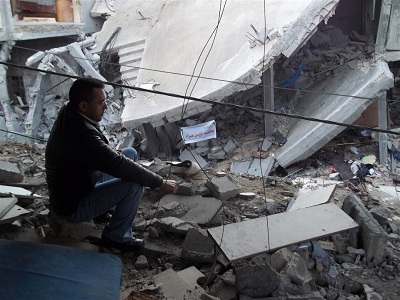
By Various Authors*
A Swedish major tabloid published an op-ed on 9 June 2015, in which Ship to Gaza was described as a media prank—not the first of its kind. What is it that our critics are so worried that the media might expose?
Is it the schools in Gaza that are forced to teach in double shifts because there are not enough classrooms since the latest massacre?
Is it that the residential buildings cannot be rebuilt because construction materials are not allowed into the area?
Is it the hospitals that cannot function because of the power outages caused by the blockade?
Or is it the Palestinian fishermen who are being attacked on a daily basis by Israeli—and sometimes Egyptian—marines in their own fishing waters? That they are killed, wounded, captured and have their boats and equipment confiscated and destroyed?
None of our critics could honestly portray Palestinian fishermen’s confrontations with blockade forces as media pranks, particularly since they are never reported on in international press.
That’s why our actions are necessary: We need to turn the eyes of the world to the lawlessness and humanitarian crisis that this blockade generates. Apparently, that concerns our critics, because they don’t want the grotesque consequences of the blockade to be visible in the media.
Our critics would have us all believe there is no blockade. According to them, it’s the Hamas government that “is keeping the Gaza residents locked up in what is commonly referred to as the world’s largest outdoor prison”.
Much can be said of Hamas, but Israel and Egypt are actually the parties responsible for preventing imports of crucial humanitarian needs and reconstruction materials. It’s their blockade that has prevented business owners in the Gaza Strip to export their goods. It’s the blockade that forbids Gazan youth to travel in order to obtain educations in medicine, law and engineering. It’s the blockade that is separating Palestinians from Palestinians. It’s the blockade force of Israel that refuses EU parliamentarians the right to investigate how European aid facilities in Gaza have been bombed into smithereens.
Our critics think we should address the humanitarian crisis in Gaza by supporting the UN and other aid organizations. Because aid, what little is allowed, is what our critics think the people of Gaza should live on while the blockade suffocates local businesses to the extent that the Hamas government is the main employer in the region.
Should they ever bother to ask the aid organizations themselves, they would learn that it’s not money or resources that is lacking. Rather, once again, it’s the blockade that has caused dependence on aid to escalate, while it simultaneously constitutes the central obstacle to any effective aid efforts.
Therefore, the aid organizations agree with us—as does the World Bank, the UN, Amnesty International, and Sweden’s former and current governments—that the blockade must end in order for a humanitarian catastrophe to be prevented and for any development toward a just peace to be plausible.
Our critics, the extreme blockade supporters, are contradicting all these representatives of the international community, as they desperately wave the so-called Palmer Report, an almost five-year-old reconciliation document that is devoid of any judicial legitimacy and that even Israel has refused to sign.
Instead, our critics ought to take a closer look at the report that the World Bank issued on 27 May. It admittedly shares a substantial part of the criticism of the local government, but, in contrast with our most tenacious critics, it manages to differentiate the main issue from a secondary issue.
The main reason why the people of Gaza are deprived of food security, health care, clean water, the possibilities of development and any future hope are once again: the blockade.
We have no objections to the criticism of the Hamas government. What we don’t accept is the notion that it would be legitimate to collectively punish 1.8 million human beings because they are deemed to have the wrong government. A government that an overwhelming majority of them never voted for. On the contrary, many of them are outspoken opponents of it.
But critics of Ship to Gaza would be hard pressed to find any government opponents that will thank the blockade forces for imprisoning and isolating them for what will soon be eight years.
Ship to Gaza is sailing once again for the sake of the people of Gaza. If that causes our critics to lose sleep at night, it probably says a lot more about them than it does about Ship to Gaza.
Staffan Granér, Media Coordinator for Ship to Gaza Sweden
Mikael M. Karlsson, Chair Ship to Gaza Sweden
Victoria Strand, M.D., spokesperson for Ship to Gaza Sweden
(English translation: Christopher Pastorella)
– This article was contributed to PalestineChronicle.com.






This is the problem for the Palestinians the brutality of the Israeli regime is being suppressed and the western media are not reporting . So nothing is ever done. We have to get all these stories through as the world lives in ignorance.Israel employ massive PR company,s to cover up any negative information .We need to do the same to make the world aware
And what makes me so angry that my City of Amsterdam wants a city bond with Tel Aviv, we made a petition, flyers printed,emails to Mayor and this Friday demonstration in front of the town hall. Why? it is slap in the face of the Palestinians people….